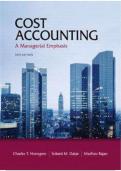Exam (elaborations)
test bank for cost accounting 14th edition by horngren datar and rajan. all 23 chapters covered.
- Course
- Institution
- Book
test bank for cost accounting 14th edition by horngren datar and rajan. all 23 chapters covered.
[Show more]



